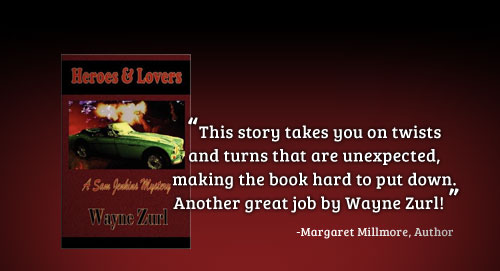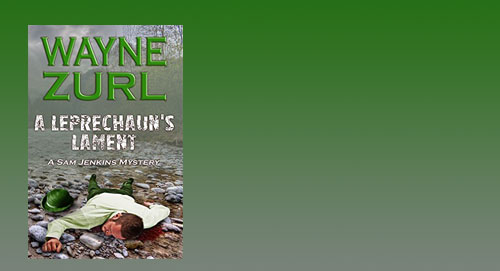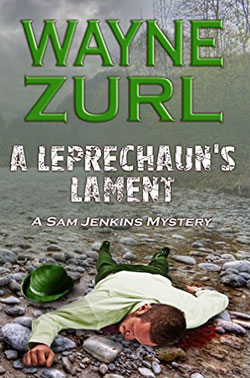Mar 28, 2013 by Wayne Zurl
I just finished HEROES AND LOVERS…really an enjoyable read. Hell, if I was a cop, I would BE Sam Jenkins…Great writing Wayne. I’m looking forward to more.
Dirk Western
Wayne Zurl is a fantastic author that grabs the reader from the first page and doesn’t let go… His characters are fully developed and realistic. His descriptions of the Great Smoky Mountains area makes one want to leave on vacation. His story-line is full of twists and turns mixed into everyday life…Then there is the main character Sam Jenkins, the kind of man who can steal a woman’s heart with a smile [and] who will not take “no” as an answer when he is trying to…find his kidnapped friend. If this is the first Sam Jenkins mystery you pick up, it won’t be your last.
Marianne Spitzer, author
This story takes you on twists and turns that are unexpected, making the book hard to put down. Another great job by Wayne Zurl!
Margaret Millmore, author
Sure, Heroes & Lovers had a good-old-fashioned mystery at the heart of the book. But, this book also delved into who Sam Jenkins is as a person. It’s the human connection that speaks to me… This book is so much more than a mystery or a detective novel. The author tackles some very serious issues…with humor and compassion. He’s created flawed, but likable characters…And all was redeemed in the end. Zurl ties up his loose ends superbly. The book was a pleasure to read from beginning to end, and that’s why I’ll be back for more Sam Jenkins books.
Tricia Darmmeh, author
Zurl captures the regional southeast flavor in his characters’ individual dialects, in his descriptive writing, and in his obvious affection for the locals. In this entry Sam has to solve the kidnapping of his friend, a local TV anchorwoman, and the assault of her cameraman… Mix in a crooked car repairman, an active drug trade, political interference, and a lot of colorful characters and you have the makings for an entertaining story. I especially appreciated the satisfying ending, where several loose ends from the complex plot are all brought together. I liked this book a lot. Highly recommended.
Jerold Last, author
The reader will mentally view a superb story unfold, aided by excellent characters who do their jobs perfectly. Zurl uses descriptions of his characters and their surroundings with skill. The dialogue is perfect and realistic.
Lee Carey, author
My uncle Lou used the word spiffy to infer that an individual had class, was cool, and had his act together… it describes Sam Jenkins…Sam is a hero with pizzazz.
Author Roy L. Murry
I love Sam’s wit and humor along with his ability to see what other’s may not. He is charming and lovable and of course the ladies all love him and I like that in spite of his charm he is faithful to his wife Katherine, who may have a smaller role in the story but definitely not a minor role in Sam’s life.
Kathleen Kelley, reviwer
I really enjoyed reading this book. It…kept my attention from start to finish. I wasn’t expecting it to end the way that it did. Always a good sign!
Melissa Waldron, reviewer
Every once in a while a really good crime / police mystery comes along that just grabs your attention and doesn’t let go until the end. And that is what Heroes & Lovers has done for me! This is the first Sam Jenkins Mystery novel that I have read, but it will not be the last. Author Wayne Zurl weaves an intriguing tale that is just a plain good ol’ fashion mystery that could only be told by a person with years of prior police experience. I really enjoyed the author’s writing style: the mixture of humor, intrigue and romantic drama engages the reader, while the story has enough twists and turns [to] keep the reader guessing what will happen next. With rich descriptions and details of the Great Smoky Mountains and rural Tennessee setting and dialect, to Sam’s sarcastic personality and the witty banter between the characters, Heroes & Lovers is an entertaining story that crime/police mystery fans will thoroughly enjoy.
Kathleen Anderson, reviewer
read more









 A new full-length Sam Jenkins mystery
A new full-length Sam Jenkins mystery



